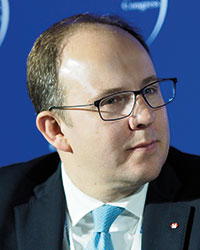

- Andrew Betts
- Regional Head of Global Trade and Receivables Finance, HSBC
There’s never been a more exciting time to be in global trade. While the headlines continue to be dominated by geopolitical challenges, positive forces are setting the scene for a promising 2019 and beyond.
Over the last 12 months, the gap between growth in trade volumes and values has decreased; and for the first time in five years, trade growth is once again outstripping global growth – by a factor of 1.5x. Trade liberalisation also continues apace, with the Comprehensive and Progressive Agreement for Trans-Pacific Partnership (CPTPP) and the EU-Japan Economic Partnership Agreement highlighting what can be achieved by like-minded partners. Together these Agreements cover almost 40% of global GDP and provide a clear statement from confident nations that a rising tide of fair trade can benefit these economies by over USD 450bn.
Arguably the most exciting trade development, however, is the pace of technology change. For several years, we have been waiting for innovations such as blockchain to deliver on their true potential. Now, we are on the cusp of exponential change in the industry – and treasurers must be ready to adapt because centuries worth of change is taking place in less than a generation.
As part of this change, a host of cumbersome, time-consuming, manual, paper-based processes are evolving into streamlined ‘one-stop-shop’ digital solutions. An early example of this is we.trade – a blockchain-based platform that HSBC has developed together with IBM and a consortium of eight other banks.
The we.trade platform seamlessly connects buyers, sellers and their respective banks, by providing a single source of information, which is visible in real time and on a need-to-know basis for each participant in each transaction. The objective is to make open account trade transactions fully digitised, easier to manage and faster to execute – cutting transaction times from around 10 days to under 24 hours.
As GPS Food Group (GPS) explains in this case study, the real-life benefits of the platform extend far beyond that. During a we.trade pilot, GPS discovered a host of additional advantages – ranging from significant security benefits to the potential for improved cash flow forecasting and more strategic buyer/supplier relationships. The power of technology innovation cannot be underestimated, it seems.
Innovation isn’t always about reinventing the wheel, though. Often, it’s about taking a different approach based on a specific situation or set of needs – the road less travelled. This is the view Meliá Hotels took when looking to optimise its working capital. Rather than taking the well-trodden route of using securitisation, the company instead chose to work with HSBC to implement a pan-European discounting programme – tailored to their large and diverse receivables portfolio. As outlined in this case study, the programme also leverages digital channels to embed automation and best practice end-to-end.
What these case studies demonstrate is that innovation is happening right now within the world of trade finance. Commercially-viable blockchain solutions are now enabling corporate treasurers to execute trade transactions with greater speed, transparency and security. And existing digital channels are being put to use in new ways by forward-thinking treasury functions to achieve efficiency gains in multiple areas of trade.
Furthermore, the scale and pace of technology adoption is creating regional innovation powerhouses – and separating corporate leaders from followers. Today, treasurers have a unique opportunity to help shape and create the future of trade finance.



